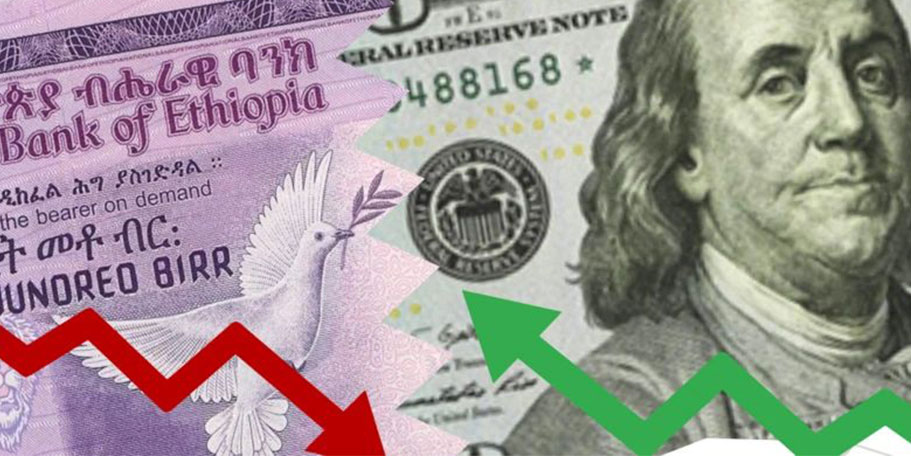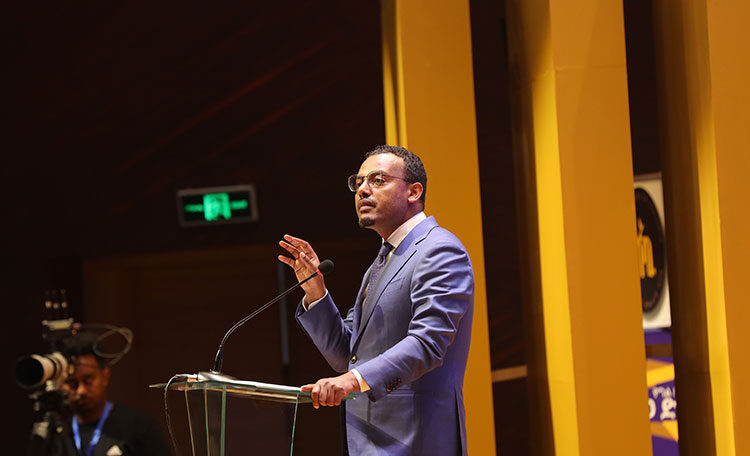A year on from the start of the federal government’s all-encompassing macroeconomic reforms and the monumental decision to float the currency, pressing questions remain about the efficacy of the changes and the overall functionality of Ethiopia’s official foreign exchange system.
The National Bank of Ethiopia (NBE) regulates the market, auctions off US dollars to commercial banks every couple of weeks, and issues directives and memos targeted at strengthening forex reserves, covering demand from traders, and minimizing disparity with the parallel forex market.
While regulators were initially met with what appeared to be success, things have begun to go awry and insiders say the official foreign exchange system exists more in name than in function.
Observers argue that the real price of foreign currency is set not in NBE auction halls but elsewhere—on encrypted Telegram channels, in the offices of brokers operating out of roadside cafes, and through whispered arrangements at unassuming commercial bank branches.
On the other hand, federal officials and NBE regulators maintain that Ethiopia’s forex system is tightly controlled and carefully managed. The central bank frequently auctions off US dollars to private commercial banks, these banks are instructed to provide the forex to “strategic sectors,” and exporters are expected to surrender half of their hard currency earnings to their respective commercial banks while importers wait their turn.
The NBE’s most recent forex auction saw participating banks bid a weighted average of 138.25 Birr for a dollar.
The government insists the current system conserves reserves, reduces inflation, and maintains macroeconomic stability.
But on the ground, people inside the system, experts, and business owners are struggling to navigate a system that has unraveled into something else entirely—a fragmented, semi-formal network of rationing, delays, and gatekeeping, where the real market for dollars and euros operates out of sight.
Encompassing mid-level bank officers, intermediaries, and other shady participants, the quiet order rewards those with connections and punishes the unlucky majority without them. For the public, this shadow market translates into an added layer of cost for nearly everything.
A banking expert who spoke to The Reporter anonymously contends the issue at the heart of today’s problems is the same thing that drove the astronomical disparity between official and parallel rates before the floating: supply and demand.
“The legal procedures are not the problem. The procedures are simple. The issue that causes delays is availability. The truth is, banks just don’t have foreign currency at hand. That’s why clients are being asked to wait. And that same shortage is the reason why the parallel market rate is heading towards 170 Birr per dollar or more. It’s due to demand pressures. As demand increases on this side, prices naturally shoot up. The core issue here is the imbalance between supply and demand,” said the expert.
He observes that forex availability differs from one bank to another.
”Some banks pretend to be helpful—saying ‘come tomorrow, maybe’—while others go completely silent. Importers, therefore, no longer go directly to their bank,” the expert told The Reporter.
He contends that existing relationships with a specific bank, issues with margins and fees, and a lack of transparency about what goes on at other banks keeps importers from opting to explore their options.
As an importer who spoke to The Reporter bluntly put it, “considering what goes on in the background, the formal forex market is a shell. The real one lives in informal channels weaved into the banking system and in office backdoors.”
The official rate currently hovers around 138 Birr per dollar, but the figure does not reflect the reality. In practice, importers calculate costs at 170 Birr per dollar or more, because that is what it takes to actually source hard currency in a country where demand heavily outweighs supply.
“What’s happening now is brokers link exporters with importers, and they’re the ones trading dollars at a markup. For example, if I’m approved to import using USD 100,000, they can demand up to 700,000 Birr in commission just to connect me with the forex source,” the importer told The Reporter.
”That’s like paying up to 7 birr per dollar in additional cost. And no—this doesn’t go to the bank. This is paid directly to the brokers doing the facilitation. They link you with an exporter, get their approval, and you get to import. But you have no choice—if you don’t pay them, you can’t import. You have no access to forex. That’s it.”
Official fees and delays aside, importers say this extra, hidden layer of cost is driving their businesses into the ground.
“You calculate based on 160 or 170 Birr per dollar, even when the bank sells it much lower,” said another importer.
The banking expert concedes that if a buyer looking for forex does not have the necessary connections, even when the currency is technically available, it is often inaccessible.
”Most of the brokers act as if they are the actual bank officers. Of course, it’s something everyone knows, but no one says out loud. It’s a taboo topic. It’s become a standard default procedure—a normalized but deeply troubling reality,” said the expert. “Even the government, I think, is aware of the gap it has created, and from time to time, it seems to tolerate or turn a blind eye to these underground mechanisms that manage forex access.”


Sources argue that for an importer, all hope of access to forex rests on successful export revenues and sheer willpower.
An exporter who spoke to The Reporter on condition of anonymity further described the increasingly informal and fragmented nature of Ethiopia’s forex ecosystem—where even legitimate exporters feel compelled to operate outside formal channels just to stay afloat.
”Let’s say someone exports goods successfully and earns foreign currency,” the exporter said. “Even if that person isn’t officially registered or licensed to sell that currency, the system still allows them to hold the forex and operate within the grey zone.”
Another industry insider, also speaking anonymously, painted a stark picture of a loss-driven trade environment.
”Our country is literally paying more to bring in its own products from abroad than we’re paying at home. Across nearly every commodity, it’s all loss—whether it’s five, six, or even ten percent. You can’t even break even anymore,” he said.
The process of exporting, according to the insider, has become a grueling, bureaucratic ordeal with diminishing returns.
“After passing through doors and offices, dealing with brokers and authorities, negotiating with buyers—it turns out exporters are making less than what you spent to export the product. Where’s the profit?” he asked.
Technically, exporters should have the first right to use the foreign currency they earn to import goods. That right enables them to benefit from the grey area.
”What ends up happening is exporters can sell that right to someone else who needs it, often through intermediaries. It’s the banks that decide who gets the forex, not you. And they link you with importers, not through direct negotiation, but through opaque channels,” said the insider.
Behind these transactions, sources claim, lies an informal network of insiders operating at the intersection of banks and broker circles.
“The game starts with a hidden surcharge. For every dollar, people pay an extra 10 to 15 Birr on top of what the banks charge. That’s the real commission. And it’s often orchestrated by brokers who are, in some cases, bank employees or have direct influence within the banks,” said one source.
He emphasized that the actual profit in the export sector no longer comes from exports themselves.
”If anyone’s making money, it’s because they’re offsetting losses with margins of 500 percent elsewhere. That tells you something: the market isn’t driven by production, it’s driven by brokerage,” he told The Reporter.
The entire structure, according to these insiders, feeds into a cost distortion that starts with forex and ends with artificially engineered high import prices. This, they argue, is the system—not a black market in the shadows, but a parallel market embedded within formal channels and dependent on relationships, commissions, and informal hierarchies inside the banking sector.
“These brokers, especially the ones around banks and forex desks, are the ones doing this,” the banking expert added. “When it comes to forex allocation, they prioritize their preferred clients.”
This informal parallel forex regime rewards connections and punishes compliance. Officially, exporters are allowed to retain 50 percent of their hard currency. Unofficially, most of it vanishes into a fog of surrender rules and negotiated conversions behind closed doors. Often, the exporter holding the forex and the importer in dire need of it never meet in person, only transacting through the bank and intermediaries.
In a press briefing held on August 6, 2025, NBE Governor Mamo Mihretu painted a notably different picture—the kind that depicts cautious optimism and assertive intervention.
He defended the integrity and direction of the official foreign exchange system, stating the central bank’s forex reserves have tripled over the past year. The Governor put the progress down to steady inflows and diligent reserve management, and forecasted that the upward trajectory would remain strong over the coming year.
“By offering a portion of our foreign currency earnings to banks through auctions,” said the Governor, “we believe we will help not only increase the foreign currency supply among banks but also stabilize the price and build confidence in the foreign currency market.”
Twenty-eight commercial banks took part in an NBE forex auction earlier this week (the ninth since auctions began in August 2024), bidding an average 138.25 Birr for a dollar. A total of USD 150 million, the highest of any auction yet, was on offer.
During his briefing, Mamo stated that each participating bank had received the full amount they requested. He argued that this would lead to better service in the coming weeks, as these banks are expected to blend the auctioned dollars with their existing reserves to meet demand from clients.
The Governor went further and listed what he described as “key achievements” of the macroeconomic reforms of the past year, including a sharp growth in monthly forex supply to the private sector, which has reportedly topped USD 500 million.


Mamo posited that banks have committed to processing forex requests within days or weeks, not months—a timeline that sharply contrasts with the realities recounted by businesspeople across the country.
Upon closer inspection, what the central bank hails as an institutional win is often experienced as bureaucratic theater by the businesses dealing directly with banks.
While the Governor encouraged these businesses to “return to the formal banking system,” importers argue the official system has become a bottleneck guarded by gatekeepers. They allege that brokers continue to mediate the most crucial transactions in ways that make the NBE auctions seem ceremonial.
“Even if the bank approves my permit, I don’t get the forex without paying a commission to the broker as well as the bank. Oftentimes the broker’s take goes up to seven Birr per dollar—just to access what’s technically already mine,” Eyoel Feseha, a vehicle importer, told The Reporter.
Another frustrated and skeptical importer highlighted what he calls an “embedded shadow system.”
“Branch managers themselves are facilitating these under-the-table deals. They make their money through ‘arrangements’,” said the importer.
Countering this growing narrative of economic pessimism, Mamo took aim at “misinformation and false rumors,” especially surrounding the exchange rate and the alleged failure of foreign currency reforms.
He insisted that the International Monetary Fund (IMF) remains supportive of Ethiopia’s reform trajectory and dismissed fears of currency devaluation or worsening forex scarcity.
The Governor cited “technical evaluations” and even claimed that the Birr’s current exchange rate is only 4.5 percent below market fundamentals.
However, many disagree. The business owners who spoke to The Reporter assert that the Governor’s statements are unrealistic and misleading, arguing the actual gap between official and parallel forex market rates is much wider than Mamo let on.
“Technically, exporters should have the first right to use export earnings for imports,” said a bank expert. “But, the power to allocate forex isn’t with the exporter or importer. It’s in the hands of middlemen—many of whom are insiders. The real market is informal, yet deeply woven into the formal sector. It’s not just tolerated. It’s normalized.”
Critics caution that what is emerging is not simply a parallel market but a parallel logic, the kind that governs access, prioritizes relationships over policy, and thrives in ambiguity.
“This is not some underground black market. This is the market now. A brokered system operating inside the banks, not outside them. That’s where the real price is set,” an importer told The Reporter.
The central bank is moving to clamp down on illegal forex transactions, especially those funneled through the diaspora.
Mamo warns that any institution or agent found operating outside legal bounds would be named and sanctioned. But stakeholders are skeptical. They observe that while offshore transactions contribute to market distortions, the real issues are domestic, nested in the same banks the NBE claims are improving service.
“The National Bank of Ethiopia has deployed a robust, technology-driven monitoring system to track all forex inflows and movements into and within the formal exchange market,” said the Governor. “Citizens who continue to operate in the informal market will face strict measures, including possible confiscation.”
He emphasized that the Bank’s ongoing investigation into illicit transactions is part of a broader effort to “safeguard the integrity of Ethiopia’s financial system and stabilize market prices.” He warned that “further punitive measures will be taken against illegal money transfer agents operating abroad.”
“Where necessary,” the Governor added, “the identities of these entities will be made public.” He specifically pointed to recent intelligence indicating “a surge in illegal operations emanating from Dubai and the wider UAE region,” noting that these actors are “distorting the forex market.”
But, with mounting public pressure and scrutiny, the central bank has yet to explain why this “system within a system” remains unchecked or why exporters and importers still struggle with opacity, favoritism, and gatekeeping.
Although the Governor’s briefing attempted to assert confidence, showcasing reform milestones and economic stabilization narratives, many stakeholders observe the contradiction is no longer between formal and informal, but between policy and practice, rhetoric and routine.
“The procedures are simple. The problem is availability. And availability is no longer decided by the central bank, rather by who you know and how much you’re willing to pay,” said one importer.
He foresees that until this informal brokerage system is confronted—and not just acknowledged—Ethiopia’s forex woes will remain subject to “the whims of middlemen.”
Economists often note that currency is not just about money, rather about trust, control, and sovereignty. Ethiopia’s forex regime—born in the socialist decades, liberalized a little more than a year ago, and still muddled by overlapping reform promises—has become a crucible of all three.
At the heart of the crisis lies not just scarcity, but selective scarcity. The decisions on who gets what, when, and at what rate are shaped by unspoken hierarchies and unregulated commissions.
In a country undergoing a macroeconomic transition under the Ethiopian Home-Grown Economic Reform program—an agenda outwardly backed by the IMF and World Bank, the fact that such distortions continue to thrive within the formal banking ecosystem exposes a deeper institutional fragility, experts warn.
Analysts contend that the state’s insistence on central control coexists with a quiet tolerance of informal brokerage systems. Those with connections can bypass the queues. Those without? They are told to “come tomorrow.”
In a country where inflation is slowing on paper, but soaring at the checkout counter, this disparity has become a daily reminder of how policy trickles unevenly across the economy.
“I don’t have a problem with the rules. I have a problem with who gets to apply them, and who gets to bend them,” said one importer.
”The market is distorted. Importing has become unsustainable. I used to be passionate about this work. Now, frankly, I don’t see how anyone could have motivation under these circumstances,” said Eyoel.
His statement contrasts sharply with Mamo’s press briefing, which painted a very different picture of the economy.
“Our macroeconomic reforms are progressing well,” said the Governor. “The exchange rate is aligned with fundamentals. The volume of exports will grow. The future is bright”.
Yet among those who actually move goods, negotiate prices, and navigate banks, hope is in short supply.
“The math no longer adds up,” said an exporter. “We lose money exporting and pay commissions importing. If anyone profits, it’s not through trade—it’s through connections and selling their right to let others utilize their currency gain.”
Businesspeople, bank officers, and brokers alike agree on one point, the system is not broken. It has evolved into a hybrid of legality and informality, where public proclamations and private deals operate in tandem.
Experts posit whether this evolution is temporary or permanent will depend on more than just monetary policy. It will depend on political will. They argue that reform without enforcement has created an unstable middle ground. Policy signals are strong, but implementation is staggered by intermediaries who profit from opacity.
If left unchecked, experts warn, these distortions will continue to sabotage Ethiopia’s industrial ambitions and the “Ethiopia Tamrit” campaign’s goal of self-reliance.
“We don’t just need new systems. We need a new culture. Right now, even the best policies are being filtered through bad habits,” said a senior banking executive, who spoke to The Reporter anonymously.





